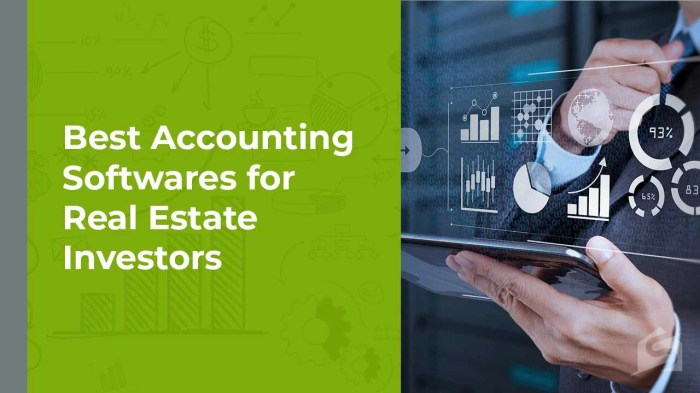Best accounting software for real estate investors is crucial for managing finances effectively. This guide explores the best options, helping you choose the right tool to streamline your operations and maximize profitability. From tracking expenses to generating reports, the right software can significantly impact your bottom line.
Different software solutions cater to various needs and budgets. We’ll delve into key features, pricing models, and user-friendliness to help you navigate the market and make an informed decision. Ultimately, the goal is to find software that fits your specific investment strategies and keeps your records organized.
Real estate investing can be a complex venture, requiring meticulous record-keeping and financial management. Choosing the right accounting software is crucial for success, allowing investors to track income, expenses, and overall profitability effectively. This guide explores the best accounting software options tailored for real estate investors, focusing on features, benefits, and considerations for different investment strategies.
Key Considerations for Choosing Real Estate Accounting Software
Selecting the right software hinges on several factors. Understanding your specific needs and investment approach is paramount. Here are some critical considerations:
Investment Portfolio Size and Complexity
Are you managing a single property or a portfolio of multiple properties? The software should scale to accommodate your needs. Small portfolios might be served by simpler, more affordable options, while larger portfolios require robust features for property management, financial reporting, and tenant tracking.
Specific Investment Strategies
Different investment strategies (e.g., fix-and-flip, long-term rentals, wholesaling) necessitate different features. For example, fix-and-flip investors need tools to track renovation costs and projected profit margins, while landlords need robust tenant management and rent collection capabilities. Consider the specific features required for your investment approach.
Budget and User Experience
Pricing models vary significantly. Some software offers free or freemium options, while others have tiered pricing structures. The chosen software should be within your budget and offer a user-friendly interface, ensuring efficient data entry and reporting. Ease of use is critical for long-term investment success.
Top Accounting Software Options for Real Estate Investors
Several excellent accounting software options cater to real estate investors. Here are a few top contenders, highlighting their strengths and weaknesses:
Xero
Xero is a popular cloud-based accounting software known for its ease of use and robust features. It excels at managing income and expenses, tracking transactions, and generating financial reports. It’s a versatile option suitable for various real estate investment strategies.
QuickBooks, Best accounting software for real estate investors
QuickBooks is a widely recognized accounting software with a strong presence in the real estate market. It provides comprehensive financial management tools, including invoicing, expense tracking, and reporting. However, it might have a steeper learning curve compared to some other options.
Wave Accounting
Wave Accounting is a free option with limited features but suitable for small-scale real estate investors. It’s excellent for basic accounting needs, streamlining tasks like invoicing and expense tracking. However, its features may be insufficient for complex investment portfolios.
Zoho Books
Zoho Books is a cloud-based accounting software with a range of features to suit real estate investors. It offers tools for invoicing, expense tracking, and reporting, as well as integrations with other business tools. Its flexibility and adaptability make it a solid choice for various investment strategies.
Advanced Features to Consider
Beyond basic accounting, some software offers advanced features that can significantly enhance real estate investment management.

Source: shoreagents.com
Property Management Tools
Look for software with integrated property management tools, allowing for tenant communication, rent collection, and lease management. These features streamline the property management process, reducing administrative burden.
Automated Reporting and Analysis
Software with automated reporting capabilities can significantly improve the efficiency of financial analysis. Real-time insights into investment performance enable better decision-making.
Tax Management Tools
Consider software with built-in tax management features, simplifying the process of tracking and reporting expenses for tax purposes. This can save time and reduce potential errors.
FAQ: Best Accounting Software For Real Estate Investors
- Q: What is the best accounting software for a real estate investor?
- A: The “best” software depends on individual needs, budget, and investment strategy. Xero, QuickBooks, Wave Accounting, and Zoho Books are all strong contenders.
- Q: How much does accounting software cost?
- A: Pricing varies greatly depending on the software and the chosen features. Some offer free or freemium options, while others have tiered pricing models.
- Q: How do I choose the right accounting software for my real estate investment needs?
- A: Consider your investment portfolio size, specific strategies, budget, and user experience. Evaluate the software’s features and functionalities, ensuring they align with your requirements.
Conclusion and Call to Action
Selecting the right accounting software is a pivotal decision for real estate investors. Thoroughly researching available options, considering individual needs, and understanding the software’s capabilities are essential for maximizing investment returns and minimizing administrative burdens. Start exploring the options today to enhance your real estate investment journey.
Learn more about the top accounting software for real estate investors by visiting these resources:
Start your free trial today and experience the difference!
In conclusion, selecting the best accounting software for real estate investments is a significant step toward efficient financial management. We’ve examined various options, highlighting their strengths and weaknesses to aid your decision-making process. Remember to consider your specific needs, budget, and level of technical expertise when making your final choice. By choosing wisely, you can improve your overall investment strategy and enjoy better financial control.

Source: taazaa.com
Answers to Common Questions
What are the most common accounting software platforms for real estate investors?
Popular options include Xero, QuickBooks, and FreshBooks. Each platform has its strengths, but factors like user interface, features, and pricing should be considered.
How can I integrate my existing real estate documents into the chosen accounting software?
Many platforms offer tools to import data from spreadsheets or other formats. Check the software’s documentation for specific instructions.

Source: loveproperty.life
What features should I prioritize when selecting software for real estate investment?
Key features include expense tracking, income reporting, property management tools, and tax reporting capabilities. Consider if the software integrates well with your other business tools.